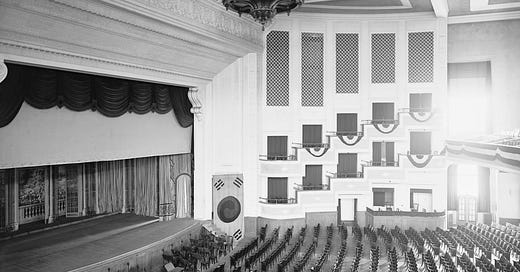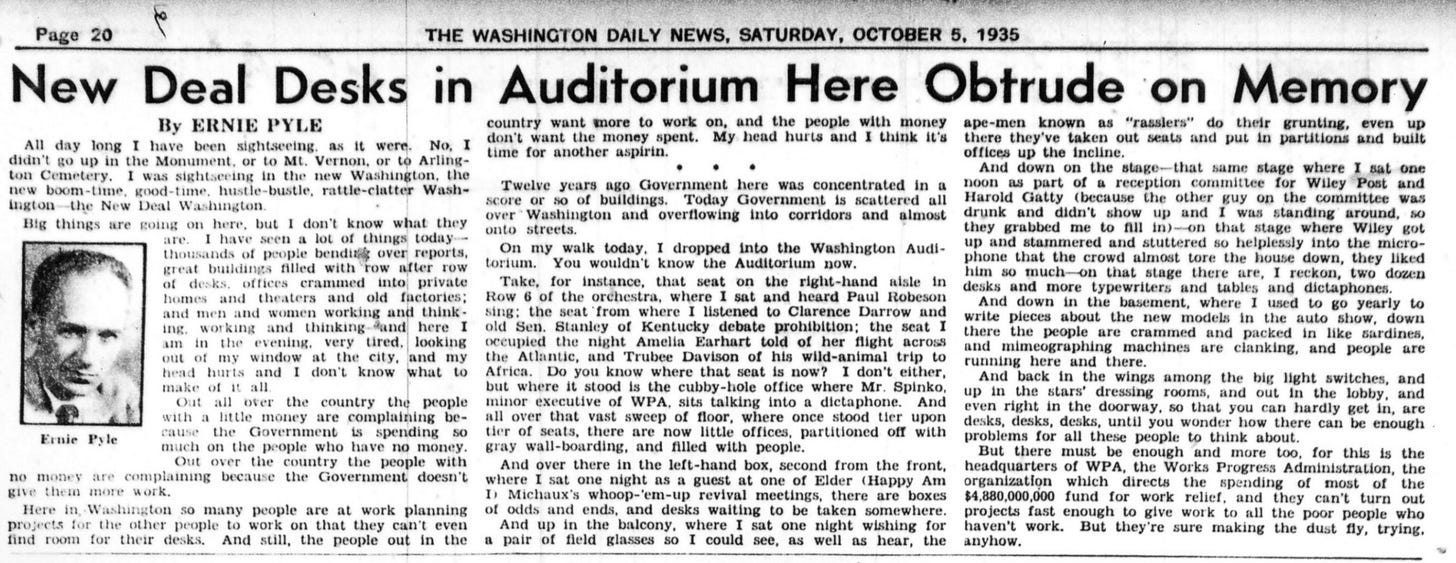THE WASHINGTON DAILY NEWS — SATURDAY, OCTOBER 5, 1935
New Deal Desks in Auditorium Here Obtrude on Memory
By ERNIE PYLE
All day long I have been sightseeing, as it were. No, I didn’t go up in the Monument, or to Mt. Vernon, or to Arlington Cemetery. I was sightseeing in the new Washington, the new boom-time, good-time, hustle-bustle, rattle-clatter Washington—the New Deal Washington.
Big things are going on here, but I don’t know what they are. I have seen a lot of things today—thousands of people bending over reports, great buildings filled with row after row of desks, offices crammed into private homes and theaters and old factories; and men and women working and thinking and working and thinking. And here I am in the evening, very tired, looking out of my window at the city, and my head hurts and I don’t know what to make of it all.
Out all over the country the people with a little money are complaining because the Government is spending so much on the people who have no money. Out over the country the people with no money are complaining because the Government doesn’t give them more work.
Here in Washington so many people are at work planning projects for the other people to work on that they can’t even find room for their desks. And still, the people of the country want more to work on, and the people with money don’t want the money spent. My head hurts and I think it’s time for another aspirin.
● ● ●
Twelve years ago Government here was concentrated in a score or so of buildings. Today Government is scattered all over Washington and overflowing into corridors and almost onto streets.
On my walk today, I dropped into the Washington Auditorium. You wouldn’t know the Auditorium now.
Take, for instance, that seat on the right-hand aisle in Row 6 of the orchestra, where I sat and heard Paul Robeson sing; the seat from where I listened to Clarence Darrow and old Sen. Stanley of Kentucky debate prohibition; the seat I occupied the night Amelia Earhart told of her flight across the Atlantic, and Trubee Davison of his wild-animal trip to Africa. Do you know where that seat is now? I don’t either, but where it stood is the cubby-hole office where Mr. Spinko, minor executive of WPA, sits talking into a dictaphone. And all over that vast sweep of floor, once stood tier upon tier of seats, there are now little offices, partitioned off with gray wall-boarding, and filled with people.
And over there in the left-hand box, second from the front, where I sat one night as a guest at one of Elder (Happy Am I) Michaux’s whoop-’em-up revival meetings, there are boxes of odds and ends, each waiting to be taken somewhere. And up in the balcony, where I sat one night wishing for a pair of field glasses so I could see, as well as hear, the ape-men known as “rasslers” do their grunting, even up there they’ve taken out seats and put in partitions and built offices up the incline.
And down on the stage—that same stage where I sat one noon as part of a reception committee for Wiley Post and Harold Gatty (because the other guy on the committee was drunk and didn’t show up and I was standing around, so they grabbed me to fill in)—on that stage where Wiley got up and stammered and stuttered so helplessly into the microphone that the crowd almost tore the house down, they liked him so much—on that stage there are, I reckon, two dozen desks and more typewriters and tables and dictaphones.
And down in the basement, where I used to go yearly to write pieces about the new models in the auto show, down there the people are crammed and packed in like sardines, and mimeographing machines are clanking, and people are running here and there.
And back in the wings among the big light switches, and up in the stars’ dressing rooms, and out in the lobby, and even right in the doorway, so that you can hardly get in, are desks, desks, desks, until you wonder how there can be enough problems for all these people to think about.
But there must be enough and more too, for this is the headquarters of WPA, the Works Progress Administration, the organization which directs the spending of most of the $4,880,000,000 fund for work relief, and they can’t turn out projects fast enough to give work to all the poor people who haven’t work. But they’re sure making the dust fly, trying, anyhow.
💛 **Enjoyed this post?** Your support helps us continue to transcribe and promote Ernie’s work. Please click the link below to donate.





